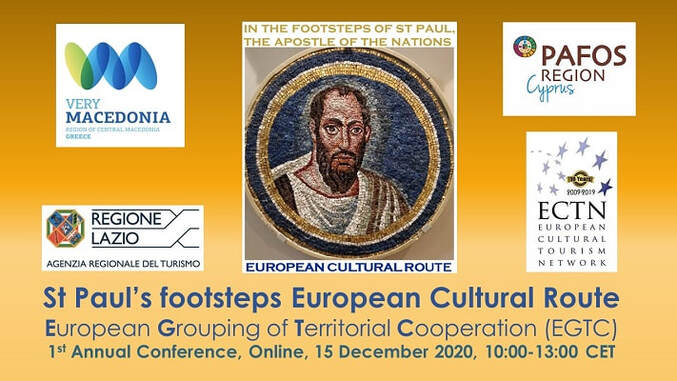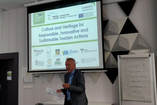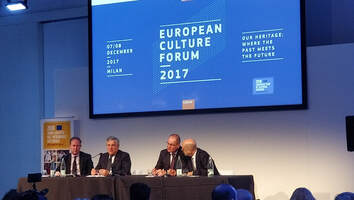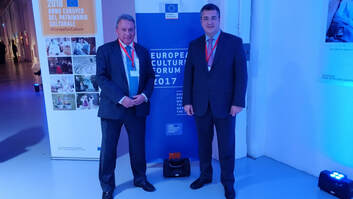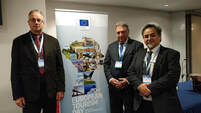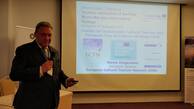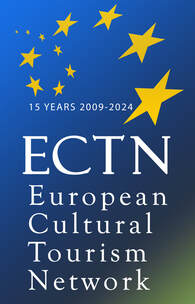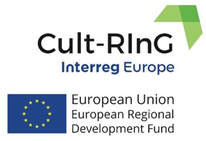
ECTN organised the 1st Conference of European Cultural Route:
'In the footsteps of Saint Paul, the Apostle of the nations'
ECTN organised the 1st Conference as a founding member of the respective European Grouping of Territorial Cooperation (EGTC), established in the frame of: Cult-RInG Interreg Europe project 'Cultural Routes as Investment for Growth and Jobs',
with partners:
- Region of Central Macedonia, Greece
- Lazio Region, Italy
- Pafos Regional Board of Tourism, Cyprus.
Programme
'In the footsteps of Saint Paul, the Apostle of the nations'
ECTN organised the 1st Conference as a founding member of the respective European Grouping of Territorial Cooperation (EGTC), established in the frame of: Cult-RInG Interreg Europe project 'Cultural Routes as Investment for Growth and Jobs',
with partners:
- Region of Central Macedonia, Greece
- Lazio Region, Italy
- Pafos Regional Board of Tourism, Cyprus.
Programme

A Participatory Lab was held at the European Week of Regions and Cities 2020 digital event, on:
Cultural & Creative Industries 4 Tourism
on 13 October 2020, organised by European Cultural Tourism Network (ECTN), as advisory partner of Cult-CreaTE Interreg Europe project
Cultural & Creative Industries contribution to Cultural and Creative Tourism
Programme
Moderator: Raitis Sijas, VTA Chairman, ECTN President, Cult-CreaTE Intererg Europe Project lead partner
Introduction by Manos Vougioukas, ECTN Secretary-General
Synergies with other ECTN projects/initiatives:
• ECTN Charter for Sustainable Cultural Tourism
• CHRISTA Interreg Europe Project
• Cult-RInG Interreg Europe project
• FOODBIZ Erasmus+ Project
• Cult-CreaTE Interreg Europe project outline
Storyteller 1: Chiara Rossetto, Veneto Region, IT
Identification of CCIs and potential contribution to CCT
Storyteller 2: Matina Zisiadou, Officer, Nicosia Tourism Board, CY
Best Practices of CCT based on CCIs
Creative Tourism, Caroline Couret, Director, Creative Tourism Network
Discussion by Cult-CreaTE Project Partners:
• Michelle Carew, Arts Officer, Cork City Council, IE
• Bianka Vámhidy, Pecs-Baranya Chamber of Commerce and Industry, HU
• Eva Koljera, Vidzeme Tourism Association, LV
• Dundee City Council, Scotland, UK
• Kujawsko-Pomorskie Region, PL
• Thomai Manganari, Naoussa Municipality, EL
Closing remarks by ECTN President.
Short Description
Deployment of Cultural and Creative Industries (CCIs) for the development and promotion of Cultural and Creative Tourism Strategies (CCT).
CCIs refer to cultural heritage, design, crafts, digital products, performing and visual arts, film, video, music, TV and radio, festivals, advertising, architecture, fashion, archives and libraries, audio-visual, multimedia, publishing, museums and galleries, R&D, software, toys and games, video games and high-end products. CCT involves co-creation.
Cultural and Creative Industries (CCIs) contribution to Cultural and Creative Tourism (CCT) for Empowering Citizens
Exchange knowledge and sharing experiences on CCIs role, best practices, achievements and eliciting opinions regarding their further potential in developing and promoting CCT, with special emphasis on 'co-creation' of innovative tourism products and services.
Main topics:
Best Practices of CCT based on CCIs
CCT Product Development with Co-creation
Governance and Business Models for CCIs to develop CCT.
Video:
https://euregionsweek2020-video.eu/video/cultural-and-creative-industries-4-tourism
Cultural & Creative Industries 4 Tourism
on 13 October 2020, organised by European Cultural Tourism Network (ECTN), as advisory partner of Cult-CreaTE Interreg Europe project
Cultural & Creative Industries contribution to Cultural and Creative Tourism
Programme
Moderator: Raitis Sijas, VTA Chairman, ECTN President, Cult-CreaTE Intererg Europe Project lead partner
Introduction by Manos Vougioukas, ECTN Secretary-General
Synergies with other ECTN projects/initiatives:
• ECTN Charter for Sustainable Cultural Tourism
• CHRISTA Interreg Europe Project
• Cult-RInG Interreg Europe project
• FOODBIZ Erasmus+ Project
• Cult-CreaTE Interreg Europe project outline
Storyteller 1: Chiara Rossetto, Veneto Region, IT
Identification of CCIs and potential contribution to CCT
Storyteller 2: Matina Zisiadou, Officer, Nicosia Tourism Board, CY
Best Practices of CCT based on CCIs
Creative Tourism, Caroline Couret, Director, Creative Tourism Network
Discussion by Cult-CreaTE Project Partners:
• Michelle Carew, Arts Officer, Cork City Council, IE
• Bianka Vámhidy, Pecs-Baranya Chamber of Commerce and Industry, HU
• Eva Koljera, Vidzeme Tourism Association, LV
• Dundee City Council, Scotland, UK
• Kujawsko-Pomorskie Region, PL
• Thomai Manganari, Naoussa Municipality, EL
Closing remarks by ECTN President.
Short Description
Deployment of Cultural and Creative Industries (CCIs) for the development and promotion of Cultural and Creative Tourism Strategies (CCT).
CCIs refer to cultural heritage, design, crafts, digital products, performing and visual arts, film, video, music, TV and radio, festivals, advertising, architecture, fashion, archives and libraries, audio-visual, multimedia, publishing, museums and galleries, R&D, software, toys and games, video games and high-end products. CCT involves co-creation.
Cultural and Creative Industries (CCIs) contribution to Cultural and Creative Tourism (CCT) for Empowering Citizens
Exchange knowledge and sharing experiences on CCIs role, best practices, achievements and eliciting opinions regarding their further potential in developing and promoting CCT, with special emphasis on 'co-creation' of innovative tourism products and services.
Main topics:
Best Practices of CCT based on CCIs
CCT Product Development with Co-creation
Governance and Business Models for CCIs to develop CCT.
Video:
https://euregionsweek2020-video.eu/video/cultural-and-creative-industries-4-tourism
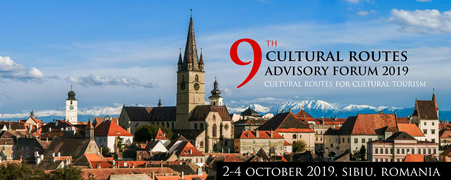
ECTN participated at the 9th Cultural Routes Advisory Forum 2019
held at Sibiu, Romania, 2-4 October 2019, on the theme of:
'Cultural Routes for Cultural Tourism'
organised by the Council of Europe and EICR
Sibiu County Tourism association is a member of ECTN.
The Forum was concluded with the Sibiu Declaration.
ECTN strongly supports the Sibiu Declaration on 'Cultural Routes for Cultural Tourism', launched at the 9th Cultural Route Advisory Forum 2019 by the Council of Europe Enlarged Partial Agreement (EPA) on Cultural Routes, held in Sibiu, Romania, on 2-4 October 2019.
This Declaration reaffirms and proposes that:
• Cultural tourism remains a priority development area for the Council of Europe Cultural Routes Programme;
• Cultural tourism allows for synergies to be developed both within and between existing Cultural Routes of the Council of Europe, so as to increase opportunities for tourists to experience the diversity of tangible and intangible heritage of Europe;
• Cooperation is continued and extended between the Cultural Routes Programme and international bodies working in support of sustainable cultural tourism development, in particular the United Nations World Tourism Organisation (UNWTO), the World Heritage Sustainable Tourism Programme of UNESCO and the European Travel Commission;
• Cooperation is continued and enhanced between the Cultural Routes Programme and the European Union Institutions (European Commission, European Parliament, European External Action Services), regional and macro-regional organisations and networks of regions, associations and networks working in the interests of the cultural tourism sector across Europe, such as the Black Sea Economic Cooperation, and the Organisation of Ibero-American States;
• There is enhanced development of international linkages and overseas sector opportunities for the Cultural Routes of Europe through cultural tourism;
• Synergies between public and private sector tourism bodies are encouraged at national, regional and local levels for the benefit of the cultural producers, heritage managers, local communities, local economies and tourists associated with the Cultural Routes of the Council of Europe Programme;
• The profile of the Council of Europe Cultural Routes Programme is enhanced through collective awareness raising and effective branding so as to support cultural tourism development activity by the Cultural Routes;
• Training and continued professional development opportunities for Route managers and members be enlarged through the European Institute of Cultural Routes, the annual Training Academy and tailored workshops in the field of cultural tourism so as to facilitate the development of high-quality cultural tourism provision;
• That research into cultural tourism development opportunities through the Cultural Routes be encouraged and undertaken through the Cultural Routes of the Council of Europe University Network, the Scientific Committees of the Cultural Routes and their local partnerships with education institutions;
• Full use is made of European funding programmes for research and exchange appertaining to cultural tourism development and research;
• Cultural tourism is addressed through its relationships to other themes relevant to the sustainable development of the Cultural Routes and discussed in future Advisory Forums, training programmes, workshops and conferences."
All of the above are addressed in various ways and at verious degrees by the Cult-RInG Interreg Europe project, which highlights the value of European Cultural Routes as investment for growth and jobs. The above will be very useful synergies with the Cult-RInG Action Plans implemented during Phase 2 of the project. The Action Plans involve improvements and extentions of existing Cultural Routes certified by the Council of Europe, such as St Jams Way in north Portugal, Via Francigena south in Lazio Region Italy, The Hansa in Vidzeme region north Latvia, St Olav Ways in west Sweden, Iter Vitis and Phoenicians in Pafos region, Cyprus, Iter Vitis in the Region of Central Macedonia, Greece.
The full declaration can be found at:
https://www.coe.int/en/web/cultural-routes/sibiu-declaration
held at Sibiu, Romania, 2-4 October 2019, on the theme of:
'Cultural Routes for Cultural Tourism'
organised by the Council of Europe and EICR
Sibiu County Tourism association is a member of ECTN.
The Forum was concluded with the Sibiu Declaration.
ECTN strongly supports the Sibiu Declaration on 'Cultural Routes for Cultural Tourism', launched at the 9th Cultural Route Advisory Forum 2019 by the Council of Europe Enlarged Partial Agreement (EPA) on Cultural Routes, held in Sibiu, Romania, on 2-4 October 2019.
This Declaration reaffirms and proposes that:
• Cultural tourism remains a priority development area for the Council of Europe Cultural Routes Programme;
• Cultural tourism allows for synergies to be developed both within and between existing Cultural Routes of the Council of Europe, so as to increase opportunities for tourists to experience the diversity of tangible and intangible heritage of Europe;
• Cooperation is continued and extended between the Cultural Routes Programme and international bodies working in support of sustainable cultural tourism development, in particular the United Nations World Tourism Organisation (UNWTO), the World Heritage Sustainable Tourism Programme of UNESCO and the European Travel Commission;
• Cooperation is continued and enhanced between the Cultural Routes Programme and the European Union Institutions (European Commission, European Parliament, European External Action Services), regional and macro-regional organisations and networks of regions, associations and networks working in the interests of the cultural tourism sector across Europe, such as the Black Sea Economic Cooperation, and the Organisation of Ibero-American States;
• There is enhanced development of international linkages and overseas sector opportunities for the Cultural Routes of Europe through cultural tourism;
• Synergies between public and private sector tourism bodies are encouraged at national, regional and local levels for the benefit of the cultural producers, heritage managers, local communities, local economies and tourists associated with the Cultural Routes of the Council of Europe Programme;
• The profile of the Council of Europe Cultural Routes Programme is enhanced through collective awareness raising and effective branding so as to support cultural tourism development activity by the Cultural Routes;
• Training and continued professional development opportunities for Route managers and members be enlarged through the European Institute of Cultural Routes, the annual Training Academy and tailored workshops in the field of cultural tourism so as to facilitate the development of high-quality cultural tourism provision;
• That research into cultural tourism development opportunities through the Cultural Routes be encouraged and undertaken through the Cultural Routes of the Council of Europe University Network, the Scientific Committees of the Cultural Routes and their local partnerships with education institutions;
• Full use is made of European funding programmes for research and exchange appertaining to cultural tourism development and research;
• Cultural tourism is addressed through its relationships to other themes relevant to the sustainable development of the Cultural Routes and discussed in future Advisory Forums, training programmes, workshops and conferences."
All of the above are addressed in various ways and at verious degrees by the Cult-RInG Interreg Europe project, which highlights the value of European Cultural Routes as investment for growth and jobs. The above will be very useful synergies with the Cult-RInG Action Plans implemented during Phase 2 of the project. The Action Plans involve improvements and extentions of existing Cultural Routes certified by the Council of Europe, such as St Jams Way in north Portugal, Via Francigena south in Lazio Region Italy, The Hansa in Vidzeme region north Latvia, St Olav Ways in west Sweden, Iter Vitis and Phoenicians in Pafos region, Cyprus, Iter Vitis in the Region of Central Macedonia, Greece.
The full declaration can be found at:
https://www.coe.int/en/web/cultural-routes/sibiu-declaration

ECTN keynote address at the International Conference on Archaeology and Tourism, entitled:
'The Charter for Sustainable Cultural Tourism &
the European Year of Cultural Heritage 2018 legacy'
'The Charter for Sustainable Cultural Tourism &
the European Year of Cultural Heritage 2018 legacy'

ECTN participated in the 3rd UNWTO/UNESCO World Conference on Tourism and CultureThe theme ‘for the Benefit of All’ had two priorities:
1) creating more inclusive partnerships between tourism and culture stakeholders that contribute to SDG implementation; and
2) promoting tourism development that encourages cultural interaction and ensures the benefits are shared by all communities involved.
1) creating more inclusive partnerships between tourism and culture stakeholders that contribute to SDG implementation; and
2) promoting tourism development that encourages cultural interaction and ensures the benefits are shared by all communities involved.
|
ECTN events in Brussels during the European Week of Cities and Regions (EWRC) 2018
9 October 2018, Radisson Blu Royal Hotel, Brussels ECTN organised two side events during the European Week of Regions and Cities (EWRC) in Brussels, on Tuesday 9 October, in the framework of Interreg Europe projects CHRISTA and Cult-RInG, as follows: Cultural Heritage for Responsible, Innovative and Sustainable Tourism Actions in Regional Development - Interreg Europe CHRISTA project results Thematic cluster: Territorial development (regional, urban, rural) This event included the launch of the ECTN "Charter for Sustainable Cultural Tourism" 3rd edition, in relation to European Year of Cultural Heritage 2018 (EYCH2018) initiative on "tourism and heritage", as well as the results of the CHRISTA Interreg Europe project and pliot actions under way. The CHRISTA project aims to protect and preserve European natural and cultural heritage assets and deploy them for the development and promotion of innovative, sustainable and responsible tourism strategies, including interpretation and digitisation. Cultural Routes as Investment for Growth and Jobs - Interreg Europe Cult-RInG project activities Thematic cluster: Economic development, employment This event presented the interim results of the Interreg Europe Cult-RInG project in terms of the value of investment in European Cultural Routes in terms of their contribution to growth and jobs and the development of new cultural routes. The event was in the frame of the European Year of Cultural Heritage 2018 (EYCH2018), initiative on "tourism and heritage". |
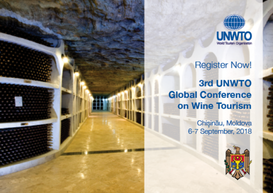
ECTN participated in the 3rd UNWTO Global Conference on Wine Tourism:
Wine Tourism as a Tool for Rural Development
Wine Tourism as a Tool for Rural Development

ECTN participated in the 2nd UNWTO World Conference on Smart Destinations 2018
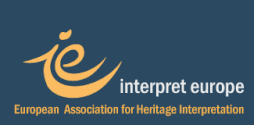
ECTN presented the CHRISTA Project Heritage Interpretation aspects for tourism at the Interpret Europe Conference 2018:
Heritage and Identity
The heritage interpretation aspects of the CHRISTA Project were presented by ECTN at the Interpret Europe Conference 2018 that took place from 23 to 26 March in Kőszeg (Hungary). This conference was part of the 2018 European Year of Cultural Heritage. Theme of this year's conference was 'Heritage and Identity'. The question of identity is key when it comes to one's feelings towards Europe in all its diversity and one's relationship with single nation states, regions and local communities. The title of ECTN's presentation was:
"Heritage Interpretation for Sustainable Cultural Tourism Policies: Interreg Europe CHRISTA Project"
Heritage and Identity
The heritage interpretation aspects of the CHRISTA Project were presented by ECTN at the Interpret Europe Conference 2018 that took place from 23 to 26 March in Kőszeg (Hungary). This conference was part of the 2018 European Year of Cultural Heritage. Theme of this year's conference was 'Heritage and Identity'. The question of identity is key when it comes to one's feelings towards Europe in all its diversity and one's relationship with single nation states, regions and local communities. The title of ECTN's presentation was:
"Heritage Interpretation for Sustainable Cultural Tourism Policies: Interreg Europe CHRISTA Project"
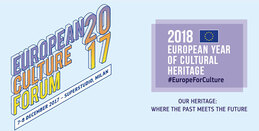
ECTN participated in the European Culture Forum in Milan, Italy,
at the launch of European Year of Cultural Heritage 2018
7-8 December 2017
ECTN is selected by the European Commission DG EAC as a member of the EYCH2018 Stakeholders Committee
at the launch of European Year of Cultural Heritage 2018
7-8 December 2017
ECTN is selected by the European Commission DG EAC as a member of the EYCH2018 Stakeholders Committee

ECTN participates in the European Tourism Day 2017 in Brussels on "The Future of Tourism"
|

ECTN at the Working Group of Member States' experts on Sustainable Cultural Tourism, in Bruges
ECTN presented its aims, activities and the Charter for Sustainable Cultural Tourism to the Open Method of Coordination (OMC) Working Group of Member States' experts Priority Area C "Cultural and Creative Sectors: Creative Economy and Innovation" Topic C3: Sustainable Cultural Tourism, in Bruges, Belgium, coordinated by the European Commission Directorate-general for Education and Culture (DG EAC), on 12 September 2017.
ECTN presented its aims, activities and the Charter for Sustainable Cultural Tourism to the Open Method of Coordination (OMC) Working Group of Member States' experts Priority Area C "Cultural and Creative Sectors: Creative Economy and Innovation" Topic C3: Sustainable Cultural Tourism, in Bruges, Belgium, coordinated by the European Commission Directorate-general for Education and Culture (DG EAC), on 12 September 2017.

ECTN presented the Charter for Sustainable Cultural Tourism at the Visitor Economy Conference at Bournemouth University, on 5 September 2017.

ECTN in the programme of the symposium 'The Future of Tourism in Europe: Promoting Competitiveness Through Sustainability and Digitisation' on the initiatives to promote Europe’s Cultural Heritage in Brussels on 4 July 2017.

ECTN participates in a high-level event of European Parliament and UNWTO on 'Connecting Europe through Innovations' in Madrid on 24 March 2017.

ECTN participates in the 1st UNWTO World Conference on Smart Destinations, Mucia, Spain, February 2017
The 1st World Conference on Smart Destinations took place at Murcia, Spain, co-organized by UN World Tourism Organization (UNWTO), the Spanish Ministry of Tourism and the Region de Murcia, with the participation of ECTN.
The 1st World Conference on Smart Destinations took place at Murcia, Spain, co-organized by UN World Tourism Organization (UNWTO), the Spanish Ministry of Tourism and the Region de Murcia, with the participation of ECTN.

ECTN joins the celebrations for the UN International Year of Sustainable Tourism for Development 2017!
The contribution of ECTN to celebrating #IY2017 is mainly in the form of sharing the Thessalia Charter for Sustainable Cultural Tourism – Second edition, which will be included in the #IY2017 website under ‘sharing solutions’, all of our events and activities planned to take place during 2017.
The contribution of ECTN to celebrating #IY2017 is mainly in the form of sharing the Thessalia Charter for Sustainable Cultural Tourism – Second edition, which will be included in the #IY2017 website under ‘sharing solutions’, all of our events and activities planned to take place during 2017.
ECTN organised a special event in Brussels on 30 November 2016, to launch the 2nd edition of the 'Charter for Sustainable Cultural Tourism' and in preparation for the European Year of Cultural Heritage 2018.
ECTN President addressed Cultural Routes Forum in Vilnius
President of European Cultural Tourism Network (ECTN), Mr Raitis Sijats, addressed the Cultural Routes of the Council of Europe Forum, which took place at the Radisson Blu Hotel Lietuva from 26 – 27 October 2016 in Vilnius, Lithuania.
President of European Cultural Tourism Network (ECTN), Mr Raitis Sijats, addressed the Cultural Routes of the Council of Europe Forum, which took place at the Radisson Blu Hotel Lietuva from 26 – 27 October 2016 in Vilnius, Lithuania.

